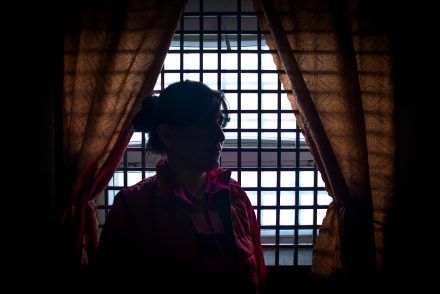UN reports that gendered stereotypes, economic deprivation, and experiences of violence and conflict are among underlying causes for women’s imprisonment
24th September 2019

On 15 May 2019, the United Nations Working Group on the issue of discrimination against women in law and in practice published a new report evaluating the root causes of women’s deprivation of liberty. In this blog, Aldyen Krieger, a member of PRI’s policy programme, reflects on the unique path of victimisation and criminalisation many women offenders in criminal justice systems face and the continued importance of effective gender-specific penal reform in the wake of the report’s findings.
With 2020 marking the 10th anniversary of the UN Bangkok Rules on women prisoners and offenders, the UN’s examination of how women are uniquely and disproportionately affected by deprivation of liberty is not only timely, but also necessary. While the Bangkok Rules require a reduction of the unnecessary imprisonment of women and measures to meet the specific needs of women who are imprisoned, this new report fills a crucial gap in UN literature by examining common themes in women’s pathways to imprisonment.
The report covers a number of different circumstances in which women are deprived of their liberty, yet in this blog, I will focus on those who are involved in the criminal justice systems. I write at a crucial period when women now constitute the fastest growing prison population globally, increasing at the alarming rate of 50 percent between 2000 and 2017, compared to the 20 percent increase of their male counterparts. The findings of this report present an opportunity to better understand this relatively recent phenomenon and find potential new points of intervention to curb this emerging trend.
Women now constitute the fastest growing prison population globally, increasing at the alarming rate of 50 percent between 2000 and 2017, compared to the 20 percent increase of their male counterparts.
The report, Women deprived of liberty: Report of the Working Group on the issue of discrimination against women in law and in practice, adopts a gendered perspective, arguing that the structural discrimination most women face throughout their life cycle is the primary cause of women’s deprivation of liberty.
The report maintains that these prejudices and stereotypes are often enshrined in national laws and practice and work to:
(1) trap women in subjugation or silence,
(2) punish them for perceived moral or sexual deviancy,
(3) smother them with overprotection.
For example, research cited in the report suggests women and girls, who display “unfeminine” behaviour, such as violence or drinking alcohol, are often perceived as worthy of institutionalisation, while similar behaviour in men and boys might be interpreted as minor or reasonable self-defence (III, B, para 23).
The Working Group also cites women’s deprivation of liberty is often linked to poverty, insofar as women’s lack of access to (1) resources and (2) opportunity. This prevalent economic “unfreedom”, as coined by the report, serves to deprive women of their choice, effectively trapping them and frequently putting them in situations that risk confinement.
“When poverty is understood to be a factor not purely of income or wealth, but also as measured by the choices, opportunities and resources available to a person over the course of their lifetime, women’s [economic “unfreedom”] appears even starker” (III, C, para 50)
Similarly, the Working Group also referenced women’s increased exposure to violence and conflict, in the (1) home and community, and the (2) instrumentalisation of women’s deprivation of liberty in times of conflict, as tools of curbing women’s agency and putting them in circumstances that often lead to their confinement.
The UN Working Group ultimately calls for a gender specific human rights centred approach to women’s structural discrimination to address the problem of women’s imprisonment. The recommendations go beyond penal mechanisms outlined in the Bangkok Rules, prioritising the transformation of legal, institutional, social and cultural aspects of societies which work to encourage and normalise harmful stereotypes and socioeconomic inequalities. Unsurprisingly, the report recommends reaching beyond criminal justice systems to ensure that women enjoy liberty to the full extent and in equal measure with men.
In relation to women’s experience of imprisonment, the report maintains that this experience is unique and disproportionate, which too is a result of the persistence of patriarchal systems which shape gender stereotypes and the forms of discrimination that normalise them.
Without a two-pronged strategy to address the issue of women’s growing prison population the number of women in prison systems will continue to rise.
Without a two-pronged strategy to address the issue of women’s growing prison population the number of women in prison systems will continue to rise. The Bangkok Rules are foundational as they impress the importance of a gender-specific bottom-up approach in criminal justice systems which give primacy to individual prisoners’ rights. This new report ought to serve as a companion tool to the Rules, approaching the issue from an equally important, top-down angle, namely, disrupting the cycle of structural discrimination against women within societal institutions. Thus, this new report ought to be understood in conjunction with the Bangkok Rules in order to maximise its’ effectiveness and aid in the overall goal of protecting the poorest and most vulnerable women from unnecessary imprisonment.
More Information
PRI has developed a comprehensive toolbox to assist in the implementation of the UN Bangkok Rules in partnership with the Thailand Institute of Justice. For a more detailed examination of current trends affecting women in the criminal justice system please see our Global Prison Trends 2019 which includes a special focus on women’s healthcare in prison. Additionally, to keep updated on current developments in women’s imprisonment internationally subscribe to our quarterly newsletter: Bangkok Rules Newsletter on women in the criminal justice system.